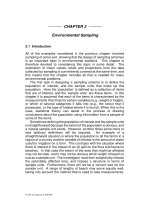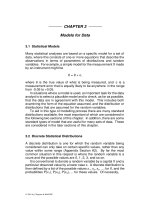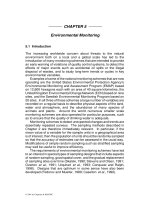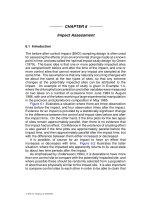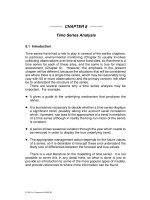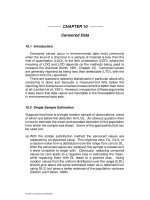Bài giảng environmental conservation and management forest resource
Bạn đang xem bản rút gọn của tài liệu. Xem và tải ngay bản đầy đủ của tài liệu tại đây (2.19 MB, 16 trang )
Bài giảng
Environmental Conservation and Management
Forest Resource
Outline
Introduction
Forest Resources
Deforestation
Timber Extraction
Mining
Dams and their effects
Introduction
Natural Resources
Natural resources are components of the atmosphere.
Natural resources are goods and services supplied by our environment
Forest, water, mineral, food, energy, land (soil), Atmosphere (air), plants
and animals
Some resources are get exhausted soon, whereas other resources would be
lasting for a long period of time
Depending on this factor, these resources are divided into two categories.
Renewable Resources (Inexhaustible Resources)
Non-renewable Resources (Exhaustible Resources)
Renewable Resources (Inexhaustible Resources)
Inexhaustible resources have the ability to reappear or replenish
themselves by recycling, reproduction or replacement. Includes :
Sunlight
Plants
Animals
Soil
Water
Living organisms
Non-renewable Resources (Exhaustible Resources)
The non- renewable resources are the earth's materials. These renewable
sources include
Minerals
Fossil fuels
Forest Resources
Forests are ecosystems characterized by a dominance of tree cover
and they contain a variety of other organisms (e.g., other plants,
animals)
Forests differ in composition and structure. These are both affected
by biotic (e.g., animals, plants, humans) and abiotic (e.g., soil,
moisture, sunlight, climate) factors
Administration purpose, India has classified forest into
Reserved forests
Production of timber and other forest products
Protected forests
Restrictions
Unclassed forests
Inaccessible forest
Importance of forest
Protective functions:
Soil erosion, against droughts, floods, intense radiations
Productive functions:
Source of wood, gums, resins, medicines, pulp, paper etc
Accessory functions
Adobe of animals and tribal people
Maintains the biodiversity of nature
Significance
Ecological significance
Balancing oxygen and carbon dioxide level in atmosphere
Hydrological cycle
Increases local precipitation and water holding capacity of soil and so preventing drought
situation
Maintains fertility of soil
Reducing global warming:
The main green house gas carbon dioxide (CO2) is absorbed by the forests as a raw material
for photosynthesis. Thus forest acts as a sink for CO2 thereby reducing global warming
Economic Significance
Wood
Timber, in building constructions
Wood as fuel
Advantage over coal as its sulfur and ash contents are very low
Excessive use is pressure on forests
Bamboo, resins, gums, fibers medicines
Deforestation
Deforestation is the clearance of naturally occurring forests by the
processes of humans logging and/or burning of trees in a forested
area
Imbalance between demand and production of fuel wood and
timber is one single factor that has contributed most to the
depletion of forests in the country
Excessive grazing, frequent farming, forest fire, shifting
cultivation
Consequences of deforestation
Decreasing soil stability
Increasing erosion
Sediment transport
Degradation of air quality
Increase in the level of green houses gas,
Effects of Deforestation
Soil erosion: the soil in slope area gets washed away with rain
water, since soil become loose due to the absence of
forests/trees.
Expansions of deserts: barren land is getting converted into
deserts due to the action of strong winds. Since there is no
barrier to strong wind because of absence of trees.
Decrease in rainfall: Forests bring rains due to high rate of
transpiration and precipitation. In the absence of forests,
rainfall declines considerably
Loss of fertile land: Less rainfall results into the loss of fertile
land owing to less natural vegetation.
Effect on climate: The climate of a region is mainly controlled by the
rainfall, snowfall, etc. Deforestation causes decrease in rainfall,
which in turn increases the climatic temperature.
Lowering of water table: Decrease in rainfall results into a lowered
water table due to lack of recharging of underground reservoirs.
Economic losses: Deforestation will cause loss of industrial timber
and non-timber products and loss of long-term productivity on the
site.
Loss of biodiversity: Loss of flora and fauna leads to disturbances in
ecological balance worldwide. Certain species of flora and fauna are
getting extinct
Conservation of Forest
The forest conservation Act, 1980
Bans of unnecessary and avoidable forest conversion to non forest use
Compensatory afforestation
Establishments of national parks and wild life sanctururies
Afforestation Programme
Joint forest management
Removal of subsidies to industry
Industry used to get guaranteed supply of timber at low or nominal rate
Industry is expected to use forest resources efficiently
Environmental movements
Conservation of Forest Cont..
National Forest Policy
Maintain of environmental stability, preservation and restoration of
ecological balance
Preservation of remaining natural forests, maintaining the vast diversity
of flora and fauna
Control soil erosion
Checking extensions of sand dunes in the desert areas
Increasing forest/tree cover in the country
Looking for substitution of wood
Awareness through movements
Timber Extraction
Impact of timber extraction
Loss of biodiversity
Loss of animal habitat and plan species
Drought, soil erosion
Drying of forest lead to increase risk of forest fire
Loss of carbon storage capacity
Reduces atmospheric CO2
Additional carbon released
Mining
Coal is mined either by surface or underground methods
Ground is cleared of vegetation and the soil is removed resulting is
disfiguring of land
Impact of surface mining on Environment
Soil erosion
Blasting operation in the surface results in air pollution
Impact of Underground Mining on Environment
Land Damage: Damaging the strata
Environment Pollution
Mismanagement of Land-use
Impact of coal mining on Human Health
Dams
Series of large dams planned on the major rivers of India
Promised to solve problem of hunger, starvation. Control floods
Ecological costs of large dams were underestimated and largely
ignored
Dams are single largest cause of displacement accounting for 75% to
80% of the total displacement
Well known struggle
Narmada Bachao Andolan



